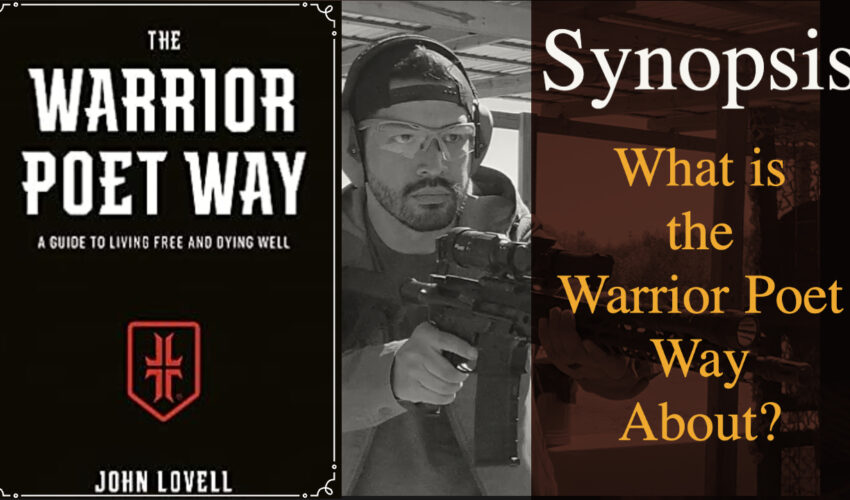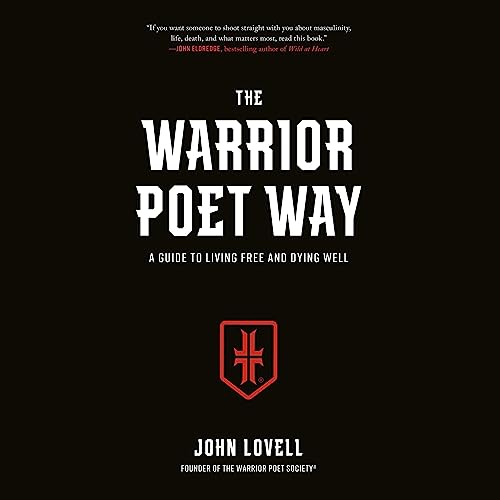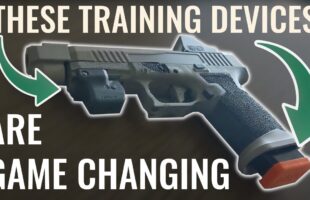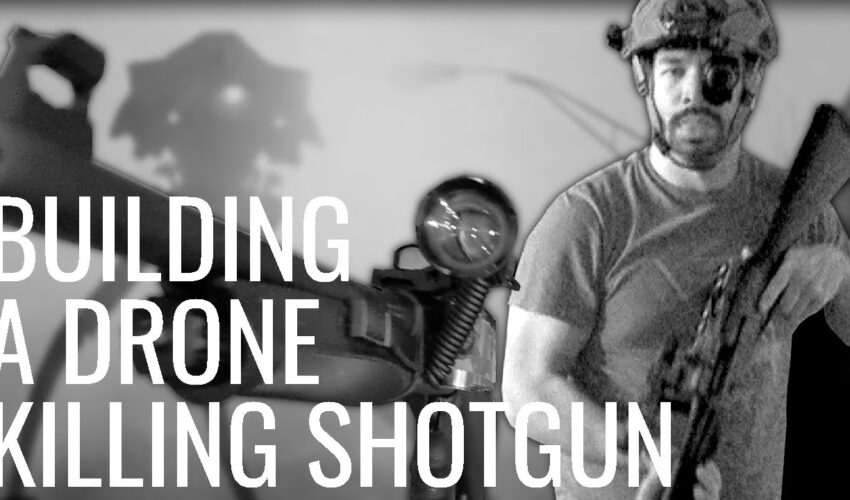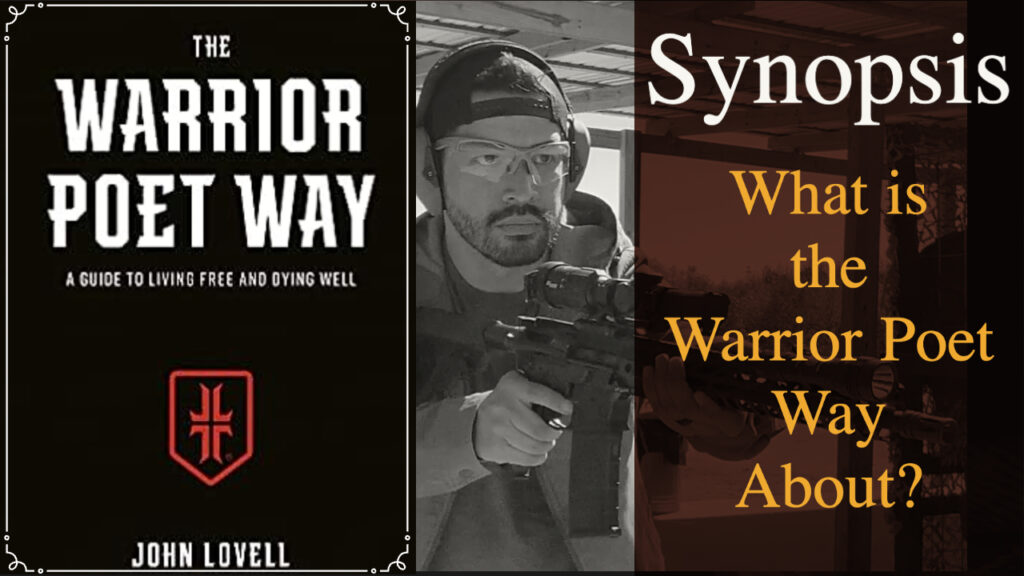
Introduction
I wanted to provide a chapter by chapter breakdown of the Warrior Poet Way. I love John Lovell (in the Biblical Philia (φιλία) / friendship / brotherhood context of course), even though I’ve never met the man, I feel like I know the guy. united under Christ. Like many of you, I have been a fan of Warrior Poet Society content for many years. John is a thought leader, a rare role model in modern society, but moreover, He is a fellow brother in Christ. His personality on camera makes it feel like a conversation, like another he’s just another bro hanging out. His book feels much the same way, but yet in a deeper, almost discipling context. The book was everything I wanted, but also, everything I needed at this season of life.
As soon as John announced this book, I pre-ordered it. I knew it would be good, but I didn’t realize the extent it would impact me. There are a few authors who have had this effect on me. The puritans, namely, John Bunyan. Relatively not well known men’s author, Steve Farrar. Greg Morse of desiringgod.org. John Piper, Paul Washer, Charles Spurgeon, C.S. Lewis, this list can go on and on. Amongst that list of great authors in my mind, now as well, John Lovell.
Warrior Poet Way
The Warrior Poet Way is an excellent read. In many ways, it has already impacted my life. I’m excited to write a short review soon.
Just a Synopsis for now…
By God’s providence, he brought this book to me at a time when I really needed it. I will eventually write an in depth review of this book, after I get a chance mull everything over. I need to take time to search the Bible, to reinforce the challenges that this book has shined light on in my life. I am not yet ready to write this review in any meaningful way, and yet, I want to get the word out there about this important work because frankly, every man can get something out of this book.
So I’m releasing a synopsis about this book first, essentially the notes that I took from each chapter, a practice that I like to do when reading any book about life or theology, so that I can hammer home and reinforce the points in my own mind. I will follow up, when I am ready, with a full on review of the book itself.
However, let me just begin by saying that only two days after I finished reading this book, already, my life has been challenged in multiple ways that this book helped me address. For this reason, I do not want to delay in promoting this book, and releasing a synopsis felt like the right way to do that.
A Sincere thank you to John
In many ways it was God’s sovereignty that this book fell into my lap at the time that it did. I thank the Lord for sending a servant like John Lovell who has a heart for pouring into the lives of men and pointing them back Jesus. John, if you ever happen to read this, I thank the Lord that like David, you have a heart after God’s own heart. It is evident that you characterize every value that you recommend in this book. If I never get the opportunity in this life to thank you in person; somewhere around a campfire in eternity with Jesus, after a life lived and died well, I am certain that I will get that chance.
Introduction of the Warrior Poet Way
Even though he himself encapsulates all of the values that he presents, the book is not a book about himself. John is more like a guide. He looks back to some of the Warrior Poets that have best exhibited the Warrior Poet Way throughout history, and he expounds upon the characteristics that these men exhibit, that seem so elusive to the modern man.
This is the key point of the Warrior Poet mindset. It’s a case that John makes for the modern man regardless of background. The Warrior Poet Way is not a political movement. It is not tied to a specific religion. It is however an ethos of living that makes the case that a man must be more than a brute, and more than a romantic. A man must be both. A man must be dangerous, and he must be good. It is a guidebook to living a life of purpose and meaning.
John promotes that every man become dangerous, both in physical capability, but perhaps more, in mindset and ideologically. John embraces what makes men, men. A certain grit, perseverance, integrity, boldness, braveness yet paired with romanticism and gentleness.
John is quick to point out that the enemy isn’t another person. The enemy is within. It is the weak man that we all, at times, are. A man who is striving to be better, a man who has a picture in his mind of the man he could still yet become. If we always strive for more, we will do as the subtitle of the book says, we will live free and die well.
Chapter 1: A World in Need of Warriors
This is the stage that John sets right in the introduction of his book through the first chapter. John sets up the mindset. While he does not say this outright, he puts the responsibility on the individual reader, a tone continued throughout the entire book. I am the captain of my own ship. My problems are my own to solve. My weaknesses can be improved. I can be a better man. The world, my kids, my wife, they need me to be a better man. This is all set in Chapter 1, a World in Need of Warriors. Not every warrior goes to war. The every day man who is striving for this standard of self sacrfice daily in every area of life out of love and protection of others, is a Warrior Poet.
Chapter 2: The Most Dangerous Man in the Room
In Chapter 2, The Most Dangerous Man in the Room, John addresses a critical tendency that many men have. We let our pride and arrogance become a massive liability in our lives. Men need to become dangerous in many regards. We need to forge the kind of character that makes a man dangerous. All of the best, masculine attributes, we need to embrace. Society would like a pacified version of mankind. However, in a fallen world, dangerous men, who are good, are always needed.
John differentiates the types of dangerous men. If you are familiar with his Youtube channel, you’ve heard this message before. I won’t steal his thunder, but he breaks down the differences between 3 types of dangerous men, only one type being the kind to strive after. Many of us fall into the other two categories in aspects of our lives, and being honest about those areas, are how we improve and become better men ourselves.
The most dangerous man in the room in the man who is smart, disciplined, and strong, but who does not need to showcase that to the world externally. There is a time to shine, and there’s a time to blend in. We want to be the man who doesn’t stand out until he absolutely has too, so he can make the biggest positive impact when he is needed most.
John is advocating for a gentle and calm strength. The readiness to flip between them at the drop of a hat. A man who can be safe and trusted when amongst women and children, but in a moment is ready to slay dragons whenever the need arises, litterally or rhetorically. He is advocating for men who are both lion and lamb. Not safe, but good. John wants men to actually become what they admire.
Chapter 3: John encourages us to battle the inner coward
In Chapter 3, John encourages us to battle the inner coward. John references the Apostle Paul who in the New Testament of the Bible often refers to this as “the flesh”. Our fallen bodies that crave sin and comfort. That do what we know we ought not to do. John makes the case today that men value being nice and peaceable over doing the hard thing of what is required.
So how do we overcome this? John makes the case that it starts in our heart and then ripples through our entire being. This inner coward will always creep its head up, especially when we become passive and complacent in our highest moments. The best way to defend against this? Become stronger with every life challenge and victory. Get used to doing hard things. Learn by confronting and conquering difficulty and danger. Regularly test our strength and bodies, inside and out. Not giving an inch.
John points to King David, a man who fell from grace but found a place of repentance. Repentance, as Paul Washer puts it, is a changing of the mind. A litteral re-orientation of the mind towards doing what is right instead of what is easy. A turning away from the deeds of the flesh that the Apostle Paul speaks of. John Lovell is speaking the same language as the great theologian John Owen, be killing sin or it will be killing you.
John above all wants us to kill pride. We are the problem that needs to be fixed. We need to take personal responsibility. Humility is the only way to do this.
Chapter 4
In Chapter 4, John makes the case for facing death before you die. The idea here is realizing your own mortality and living each life as if it were your last. This way, you can live with no regrets. If you live this way, you can be entirely focused on whatever the mission calls for, being able to act selflessly, knowing with absolute certainty that your affairs are in order. He suggests periodically writing a death letter to those that you love, so that you are forced to stare death in the face and focus on what really matters. Then living every day with that in mind. He points to Jesus as the pinnacle of living and dying well. John speaks of the martyrs, those who would be able to die well because they knew of the eternal realities that awaited them.
It’s in this chapter that John makes the case that only through living by faith, can one really meet this ideal. He compares two great minds, Sigmond Frued and C.S. Lewis. One man who died poorly and one man who died well. John’s own ideal desire is to finish strong, surrounded by family, knowing he lived life well.
Chapter 5: The War of Ideas
In Chapter 5, John introduces the reader to a War of Ideas. He begins by describing his experiences in a philosophy class at an American college, where students entered the class room with their own varying ideas about truth and reality, and leaving with absolutely no sense of truth and reality. John warns about psuedo-acedemics, an environment where a moral relativism of anti philosophy was being masqueraded as philosophy. Cultural deconstruction.
John makes the case that philosophy is absolutely required for each warrior poet. What we believe is how we’ll live. John makes the case that modern philosophers are really anti philosophers, destroying philosophy. John makes the case for a moral law, one established by God. If there is no moral authority, than who dictates morality? Failure to see this saps joy and the ability to really see life as we should.
John calls men to become philosophers. To stand up and protect our heritage, a call to stand firm and to stand up for what is right. Every good man must be a philosopher. He must be a poet. He must know what he believes. John finishes with a call for men to take up reading again, and to read solid authors.
Chapter 6: Every Warrior Needs a Muse
In Chapter 6, Every Warrior Needs a Muse, John shares what gives him purpose, what drives him. John has many muses in his life. His wife and children being a few. However, there is one ultimate muse that drives him and ties absolutely everything else together with a single purpose. Jesus Christ.
John’s purpose is to love and serve Jesus Christ. This lays the ground for every relationship John has and for everything that he does.
Further, regarding our families, John reminds us the chase. How did we pursue our wives when we were first dating and are we still pursuing her with the same veracity? Love demands your all. Commitment is what matters, and it is lifelong. We cannot become complacent. Love is not about feeling. Marriage is a covenant binding two souls together. A covenant is a deeper calling than this feels good for right now. Loving when you don’t feel like it is tough work, but it forges you into a better person. The point of the marriage covenant isn’t to make you happy. It is to make you holy.
To love well, men have to balance both sides of themselves, the warrior and the poet.
Chapter 7: Learn to Dance
In Chapter 7, Learn to Dance, John encourages his readers to do something that is scary for most of us, learning to do things that are outside of our comfort zone that we know will be good for us, that will stretch us. For most of us, that includes finding balance between warrior and poet, that is, identifying what makes us rock hard, unable to feel or connect with our wives or our families. An inability to do this destroys marriages and leads to a life that is joyless and passionless.
For those who are soft and weak, they need to become harder. John makes this clear. For those who are over the top in pursuit of our goals, whether they be entreprenuerial or physical, to the point of being wreckless, John encourages us to find boundaries. John teaches us that its okay to say no to people and that you cannot be a people pleaser.
Lastly, there’s some incredible excerpts written by John’s wife about how he learned to dance, figuratively, having transitioned from military life back to civilian life, on the path to becoming a whole man, a man of war and a man of poetry.
John finishes this out by bringing up King David, the warrior king who stacked bodies like no-ones business, and the deep thinker who wrote the psalms and danced in worship of his Lord.
The practical application? Learn to actually dance bro, litterally and metaphorically. Stop being a prick.
Chapter 8: “Goodness, Not Greatness”
In Chapter 8, “Goodness, Not Greatness”, John level sets what a successful life looks like. He paints a powerful picture, contrasting two funerals, one of a man who is a titan of business, and one who is a man who served the community. One man in the world’s view was great for his accomplishments, but not good. The other man was good, but no-one knew his name. Which man would people weep for at the funeral?
John explains that greatness isn’t neccessarily wrong, but the pursuit of it presents the dangerous possibility of wasting your life. Greatness without goodness is meaningless. Goodness should be our ultimate aim. Greatness, is always trumped by goodness. Certainly a man can be great and good, but if he is great and not good, he is nothing.
Chapter 9:
In Chapter 9, John talks a great deal about parenting, what is wrong about the modern state of parenting, and calls out the men who aren’t, while spurring on the men who are, leading their families well. This chapter is all about fathering your children properly.
John opens by discussing what good parenting looks like. Namely, good parenting involves a man and a woman, working together, not undermining one another, to raise a family. There are some things that only a man can teach a boy about being a boy. There are some things only a mother van do to properly nurture the boy. He needs both to be a whole man, a warrior poet.
It is a moms job to keep the children alive, it is the dads job to teach the children how not to be killed. A woman teaches children how to love, a man teaches children to be strong. This combination of generations of poor parenting have contributed to the state of masculinity today.
However all is not lost. We can do better, be better, and in this chapter John gives us practical ways how.
Chapter 10
In chapter 10, John covers all of the stuff you probably would have expected this book to be about if you only have a cursory look at the Warrior Poet society guntube content. Chapter 10 is all about how we stay free as a society. John just barely touches on gun stuff, preparedness, and the whole chapter feels like a crash course in these topics.
I think this is a good thing that John covers this stuff at the end, just like icing on the cake. All of these things are good skills to have, they’re necessary, but John tackles in the first 9 chapters of the book everything that is relevant to the here and now. The first 9 chapters of the book are focused on the most important things in life, the why for Chapter 10. Chapter 10 is the practical stuff to safeguard the really hard things in chapters 1-9. This was a good decision on John’s part in my opinion, but I’ll talk more about this when I actually review the book.
Conclusion
John closes the Warrior poet way out by recapping the general points about what it means to live well and die well. In the end John alludes to his ultimate purpose, which is to bring glory to God. He looks forward to eternity.
However, John encourages those who don’t necessarily believe the same way he does to seek higher purpose and to seek out the answer to the universal life question of finding purpose that is beyond time and space as we know it. In this sense, I think John is pointing them to search for more. I do hope that if anyone has not found Jesus, that they’ll read this book and be encourage to search. If one has found the Lord, they will be immensely encouraged to live a life worth of that calling.
In many ways, this was a book I needed to read in this season of life, and I am thankful to the Lord that it was released at this exact time in history.
Warrior Poet Way
The Warrior Poet Way is an excellent read. In many ways, it has already impacted my life. I’m excited to write a short review soon.
